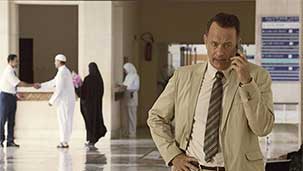Hollywood films set in the Middle East leave much to be desired. But, having grown up thereabouts, I will sit through a fair amount of uncomfortable (if not downright offensive) stereotyping and questionable casting in exchange for a small dose of familiar sights and sounds from my childhood. A Hologram for the King, Tom Tykwer’s adaptation of Dave Eggers’ novel, is a pleasant surprise in many ways. Anyone looking for exacting cultural authenticity will probably be disappointed (then again, if anyone expects cultural authenticity in a Hollywood movie I have a sub-Arctic orange grove I’d like to sell them), but it hits other marks in unexpectedly nuanced ways.
Also, it’s a film set in the Middle East that is refreshingly free of explosions, torture, shrieking terrorists, or Westerners mangling the Arabic language, so there’s that (yes, the bar is that low).
Salesman Alan Clay holds a lot of different narrative threads together; the film is equal parts fish out of water tale/aging Baby Boomer elegy for times past/East-West romance/socio-economic critique, and therefore presents no shortage of opportunities to completely lose direction. Somehow it all fits together reasonably well, and the plot shifts between angles without losing its sense of continuity.
I can see how one could accuse the film of lacking depth. It doesn’t get chest-thumpingly self-righteous about the more uncomfortable aspects of Saudi society and politics, but there are some strikingly profound moments which are overshadowed by the more superficial, farcical adventures Alan goes on as he waits indefinitely to make his sales pitch to the King, and if you catch them, you appreciate them all the more. I’d wager this is due to your input as the production’s cultural advisor. I don’t know what your advice was, but it worked. The film’s most genuine moments are silent and understated, and provide a commentary that runs neatly parallel to the main narrative.
For all of Alan Clay’s wanderings and misadventures in the desert kingdom, we hardly see the ‘real’ Saudi Arabia, except for a brief sojourn into the rural part of the country with Alan’s driver, Abdullah. Normally, I would find that disappointing, but here it somehow fits, because rarely do Western expats in the Middle East catch more than a passing glimpse of the ‘real’ country they’re in. It’s near impossible to watch anything set in Saudi Arabia without thinking of all the shit you know goes on there. Anyone expecting an on-the-nose soapbox moment regarding the country’s socio-economic situation is watching the wrong film, but it would be unfair to dismiss it as being blind to the same.
The ‘real’ Saudi Arabia emerges subtly, in quiet, fleeting moments, and perhaps you have to know what you’re looking for to see it. For example, there are no locals in sight at the wild, after-hours bacchanalia Alan attends at the Danish embassy. When Abdullah accompanies Alan into a meeting, he is ignored by the staff and snapped at by a local official. And right at the bottom of the ladder are the migrant workers, toiling away at constructions sites, visible only in blink-and-miss instances, and no one but Alan ever even acknowledges their presence. What could be seen as offensive - relegating them to the periphery of the narrative - is, in reality, exactly where they exist. Being all but invisible is what they are forced to do. Instead, it is an elegant, nuanced way of portraying a hugely controversial status quo, and it could only have been achieved with insight and guidance from someone who is more intimately familiar with that place and that way of life.
I had steeled myself for yet another shallow caricature of a foreign culture, but A Hologram for the King doesn’t fall into that trap. There are a couple of car bomb jokes (if we must we must, I suppose), but otherwise the characters are portrayed with a merciful lack of stereotyping. I was a little peeved that the two main Arab characters are portrayed by non-Arab actors, but then also really excited that all the local characters had actual names, rather than ‘Receptionist in hijab’ or ‘Bedouin with gun’ (yes, the bar is that low). I can only speculate as to what sort of advice or input you provided, but I choose to imagine you had some small part in contributing to a certain dignity and warmth in tone that prevents the film from being another two-hour ordeal of camel gags and terrorist jokes, and if that is indeed the case, I thank you.
Best,

Nat







